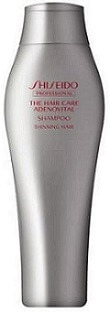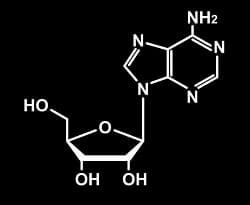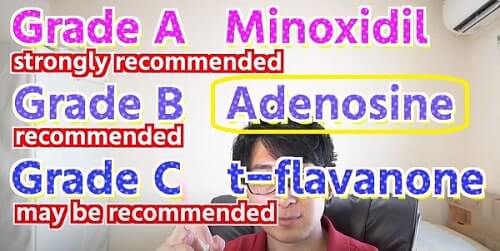
I originally wrote this post in 2014, when researching Shiseido (Japan). At the time, I came across something interesting about Shiseido’s very popular Adenosine based Adenovital hair growth products.
Subsequently, I even added the Adenovital shampoo in my best hair loss shampoos page. Make sure to read the this entire post for studies and references in regards to Adenosine’s hair growth properties.
Also make sure to read my posts on other popular hair loss shampoos such as Revivogen and Nioxin. For itchy scalps with dandruff, Nizoral is a favorite.
Shiseido Adenovital Shampoo for Hair Loss
Getting back to the Shiseido’s Adenovital shampoo, the company states the following in one of its older documents:
“We released “Medicated Flowline” in 1982 and “Medicated Adenogen” with a biogenic substance “adenosine” in 2005. “THE HAIR CARE ADENOVITAL SCALP ESSENCE” became a huge hit in the entire Asian region, recording the sales of over 1 million bottles in 1.5 years after the release in February of 2011.”
This was interesting to me because I do not remember ever hearing much about Adenosine. Of course since I wrote this post, we have much more about this key ingredient that volumizes and boosts scalp hair quality.
Update: An April 2022 study from South Korea concluded that Adenosine stimulates the Wnt/β-catenin pathway by modulating the activity of Gsk3β in cultured human dermal papilla cells. It also activated adenosine receptor signaling and increased intracellular cAMP levels and cellular energy metabolism.
Update: A May 2020 study from Hungary found Adenosine to promote human hair growth and inhibit catagen phase transition.
Scalp Essence

I has also not heard anything about the Shiseido Adenovital Vital Scalp Essence product here in the US. For more background information, see the following article on the product’s 2011 release in Asia.
Note that Shiseido also produces a hair energizing tonic formula for thinning hair that contains Adenosine as the key ingredient. In spite of its popularity in Japan and Asia, this product has never seen much publicity in the US or Europe.
Adenosine versus Minoxidil

After doing some online research, I came across a few forum threads on adenosine from the mid-2000s. But not much more thereafter. Initially, there were expectations that adenosine based products would be even better than Minoxidil when it came to hair regrowth.
Both products are thought to share some similar characteristics insofar as the mechanism of action goes. We are even today continuing to learn about the various ways in which Minoxidil works to grow hair.
Note that Adenosine is related to Adenine and Adenosine triphosphate (ATP). Some surgeons use liposomal ATP spray after hair transplants in order to aid healing and graft survival.
Update: August 30, 2020
Adenosine for Hair Loss in Japan

YoungJet just gave us an update on Dr. Takashi Tsuji and his August 25th Zoom conference. Apparently, the RIKEN team has discovered 3 new hair growth compounds that are more effective than Minoxidil.
The lecture was mainly targeted at cosmetics manufacturers and salons. The most interesting thing in this latest video from YoungJet was Dr. Tsuji mentioning “Adenosine” as a recommended hair loss product. In the US and Western Europe, Adenosine is never mentioned as a hair growth product.
Studies and References
— A 2001 study from Japan found that the positive effect of Minoxidil on hair is mediated by adenosine.
— For the female readers of this blog, a Japanese study from 2008 found adenosine to improve hair growth and thickness in women.
— A South Korean study from 2011 found that adenosine:
“Promoted the expression of several growth factors that are responsible for hair growth, including fibroblast growth factors (FGF)-7, (FGF)-2, insulin-like growth factor (IGF)-1, and vascular endothelial growth factor (VEGF).”
— A 2013 study from Iran concluded that topical application of a 0.75% adenosine solution had the same effect as Minoxidil 5% in terms of hair growth. According to patient feedback, the former was superior to Minoxidil in the treatment of androgenetic alopecia (AGA). It prevented further hair loss faster, and stimulated superior hair growth.
— More recently, a 2015 study from Japan concluded that topical adenosine increases the proportion of hair that is thick in Caucasian men with AGA. Another 2015 study from the same country found that the topical version increases thick hair ratio in Japanese men with AGA.
I wonder why we did not hear more on a product that sold over 1 million bottles in Asia in one and a half years after being introduced in 2011? My guess is that the before and after results did not prove comparable to those from Minoxidil. It is nevertheless encouraging to read about Shiseido’s lengthy history in hair loss related research and product development.
Note: A new hair loss product from Actera called Hydroxysomes® Adenosine seems interesting.